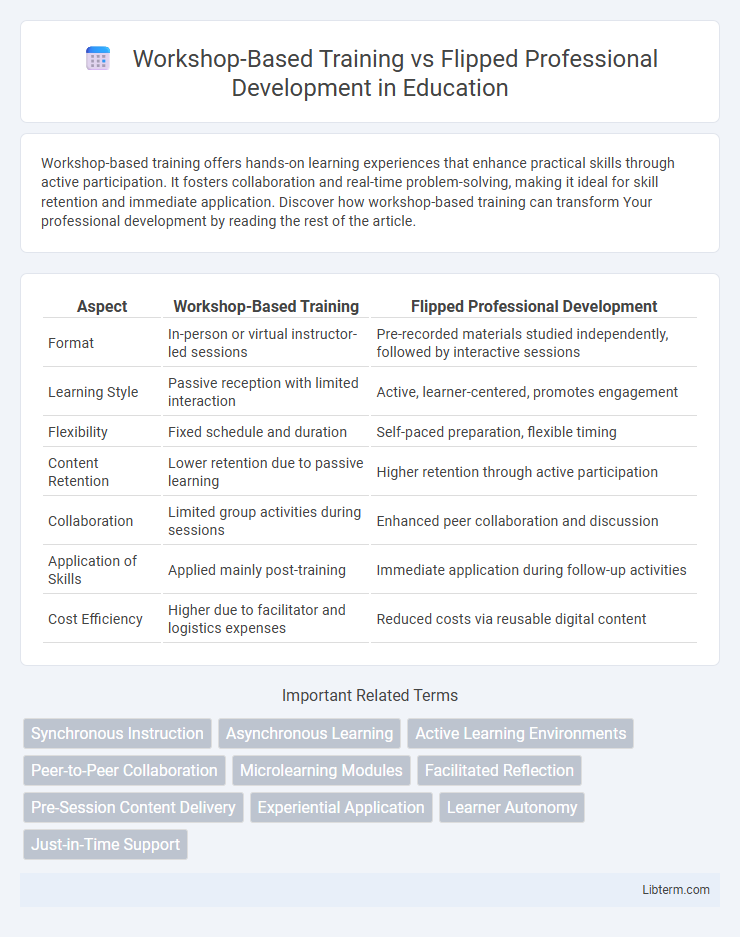Workshop-based training offers hands-on learning experiences that enhance practical skills through active participation. It fosters collaboration and real-time problem-solving, making it ideal for skill retention and immediate application. Discover how workshop-based training can transform Your professional development by reading the rest of the article.
Table of Comparison
| Aspect | Workshop-Based Training | Flipped Professional Development |
|---|---|---|
| Format | In-person or virtual instructor-led sessions | Pre-recorded materials studied independently, followed by interactive sessions |
| Learning Style | Passive reception with limited interaction | Active, learner-centered, promotes engagement |
| Flexibility | Fixed schedule and duration | Self-paced preparation, flexible timing |
| Content Retention | Lower retention due to passive learning | Higher retention through active participation |
| Collaboration | Limited group activities during sessions | Enhanced peer collaboration and discussion |
| Application of Skills | Applied mainly post-training | Immediate application during follow-up activities |
| Cost Efficiency | Higher due to facilitator and logistics expenses | Reduced costs via reusable digital content |
Introduction: Reimagining Professional Development
Workshop-based training often relies on passive learning, where educators receive information in a traditional, lecture-style format. Flipped professional development transforms this model by encouraging active participation and collaboration, allowing educators to engage with materials before sessions and apply concepts during interactive meetings. This approach fosters deeper understanding and practical implementation, promoting continuous growth and improvement in educational practices.
Defining Workshop-Based Training
Workshop-based training refers to a traditional professional development approach where educators participate in instructor-led sessions aimed at acquiring specific skills or knowledge. These trainings typically involve hands-on activities, real-time feedback, and collaborative learning within a fixed timeframe. Workshop-based training emphasizes direct expert guidance and structured content delivery to enhance teaching practices effectively.
Understanding the Flipped Professional Development Model
The Flipped Professional Development model reverses traditional training by delivering instructional content online for participants to review before workshops, allowing in-person sessions to focus on collaborative activities and practical application. This approach enhances engagement, fosters deeper understanding, and accommodates varied learning paces, contrasting with Workshop-Based Training where content delivery and practice occur simultaneously. Research shows Flipped PD increases participant interaction and knowledge retention compared to conventional training formats.
Key Differences Between Workshop-Based and Flipped Approaches
Workshop-based training primarily involves direct instructor-led sessions where participants absorb content during scheduled times, emphasizing passive learning and limited interaction. Flipped professional development reverses this model by assigning pre-session materials for individual study, allowing in-session time to focus on active collaboration, problem-solving, and applied practice. This approach enhances engagement and retention by promoting learner autonomy and deeper understanding through hands-on activities during face-to-face meetings.
Advantages of Traditional Workshop-Based Training
Workshop-based training offers structured, face-to-face learning environments that promote direct interaction between instructors and participants, enhancing immediate feedback and hands-on practice. This method facilitates real-time collaboration, networking opportunities, and the development of interpersonal skills essential for professional growth. Traditional workshops also provide clear scheduling and resource allocation, enabling organizations to efficiently manage training logistics and employee participation.
Benefits of Flipped Professional Development for Adult Learners
Flipped professional development enhances adult learning by allowing participants to engage with instructional content at their own pace, promoting greater retention and deeper understanding. This method leverages pre-session materials such as videos and readings, enabling face-to-face time for interactive discussions, application exercises, and personalized feedback. As a result, adult learners experience increased motivation, improved critical thinking skills, and the ability to immediately apply new knowledge in real-world contexts.
Challenges and Limitations of Both Methods
Workshop-based training often struggles with limited participant engagement and retention due to its one-size-fits-all approach and time constraints. Flipped professional development faces challenges such as the need for reliable technology access and self-motivation, which can impede consistent participation and application of learned materials. Both methods require careful planning to overcome difficulties in tailoring content to diverse learning styles and ensuring sustained teacher growth.
Case Studies: Real-World Outcomes and Insights
Case studies comparing workshop-based training and flipped professional development reveal distinct real-world outcomes in participant engagement and knowledge retention. Workshop-based training often shows immediate skill acquisition through hands-on activities, while flipped professional development demonstrates long-term improvement by allowing learners to absorb material at their own pace before collaborative sessions. Insights from education sectors highlight that flipped models foster deeper critical thinking and application, whereas workshops excel in building foundational competencies quickly.
Choosing the Right Model: Factors to Consider
Choosing the right professional development model requires assessing factors such as learner engagement, content complexity, and available resources. Workshop-based training offers structured, real-time interaction, ideal for hands-on skills and immediate feedback, while flipped professional development encourages self-paced learning and deeper reflection outside of sessions. Organizations should evaluate participant learning styles, time constraints, and desired outcomes to select the model that maximizes knowledge retention and application.
Future Trends in Professional Development Methods
Future trends in professional development emphasize a shift from traditional workshop-based training to flipped professional development models that leverage asynchronous learning and active in-person collaboration. Flipped professional development enhances knowledge retention, engagement, and practical application by allowing educators to access instructional content beforehand and use face-to-face time for hands-on activities and peer interaction. Integration of digital platforms, personalized learning paths, and real-time feedback mechanisms are expected to further optimize these methods for continuous educator growth.
Workshop-Based Training Infographic

 libterm.com
libterm.com